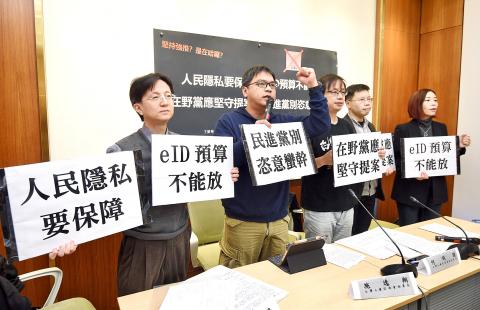Several civic groups yesterday called on opposition parties to hold their ground on freezing the funding for planned new national electronic identification cards, saying that the cards could pose information security risks for Taiwanese.
The Democratic Progressive Party (DPP) should be mindful of the risks that the cards pose to people’s basic rights and refrain from hastily passing a budget, the groups said.
The Legislative Yuan on Tuesday agreed to hold extraordinary meetings until Wednesday next week, with marathon sessions running through today and tomorrow.

Photo: Peter Lo, Taipei Times
Taiwan Association for Human Rights deputy secretary-general Ho Ming-hsuan (何明諠) cited sources as saying that the Chinese Nationalist Party (KMT) legislative caucus favors freezing the budget for the cards, while the People First Party (PFP) and the New Power Party (NPP) are in favor of reducing it.
During two question-and-answer sessions in May and September last year, opposition and some DPP legislators called into question “glaring” inadequacies in laws regarding the protection of personal information, Ho said.
Critics have called for legislative amendments to mitigate risks of exposing private information, while the Executive Yuan and the Ministry of the Interior maintained that current regulations would suffice, Ho said.
“Such statements are simply appeasing the Legislative Yuan when in fact the ministry is intending to ram the bill past the legislature,” Ho said, adding that the action was deplorable.
Open Culture Foundation president Lee Po-feng (李柏鋒) said that while the Executive Yuan’s National Development Council has said that the cards are for identification purposes and would allow Taiwanese to access digital government services, it has failed to clarify how the resulting digital footprint would be handled.
Lee said he was confused as to the DPP’s apparent about-face over the issue, citing the example of DPP Legislator Ker Chien-ming’s (柯建銘) objection to the then-Research, Development and Evaluation Commission’s national identification card project in 1998 on grounds of a lack of legal oversight.
Lee also cited the example of DPP Secretary-General Luo Wen-jia’s (羅文嘉) opposition to EasyCard vending machines being installed at elementary and junior-high schools in Taipei, citing information security concerns.
Taiwan Democracy Watch member Tu Yu-yin (涂予尹) said that the controversy over applicable uses of the planned card has far exceeded the parameters of the Household Registration Act (戶籍法) and contravenes the spirit of Council of Grand Justices Constitutional Interpretation No. 603.
Tu also said that there is no competent authority to oversee the implementation of the Personal Information Protection Act (個人資料保護法), which should be addressed.
Taiwan Forever Association secretary Peng Chih-cheng (彭至誠) said that the Household Registration Act has no reference to chipped identification cards or protection regarding personal information.
The act also lacks regulation, review standards for information generated by the use of chipped identification cards and legal procedures, which could lead to a contravention of the principles of legal reservation and legal certainty, Peng said.
Contracting outside sources to make chip-embedded identification cards could lead to duplication and people’s information being leaked to China, Peng added.

Chinese Nationalist Party (KMT) Chairman Eric Chu (朱立倫), spokeswoman Yang Chih-yu (楊智伃) and Legislator Hsieh Lung-chieh (謝龍介) would be summoned by police for questioning for leading an illegal assembly on Thursday evening last week, Minister of the Interior Liu Shyh-fang (劉世芳) said today. The three KMT officials led an assembly outside the Taipei City Prosecutors’ Office, a restricted area where public assembly is not allowed, protesting the questioning of several KMT staff and searches of KMT headquarters and offices in a recall petition forgery case. Chu, Yang and Hsieh are all suspected of contravening the Assembly and Parade Act (集會遊行法) by holding

PRAISE: Japanese visitor Takashi Kubota said the Taiwanese temple architecture images showcased in the AI Art Gallery were the most impressive displays he saw Taiwan does not have an official pavilion at the World Expo in Osaka, Japan, because of its diplomatic predicament, but the government-backed Tech World pavilion is drawing interest with its unique recreations of works by Taiwanese artists. The pavilion features an artificial intelligence (AI)-based art gallery showcasing works of famous Taiwanese artists from the Japanese colonial period using innovative technologies. Among its main simulated displays are Eastern gouache paintings by Chen Chin (陳進), Lin Yu-shan (林玉山) and Kuo Hsueh-hu (郭雪湖), who were the three young Taiwanese painters selected for the East Asian Painting exhibition in 1927. Gouache is a water-based

Taiwan would welcome the return of Honduras as a diplomatic ally if its next president decides to make such a move, Minister of Foreign Affairs Lin Chia-lung (林佳龍) said yesterday. “Of course, we would welcome Honduras if they want to restore diplomatic ties with Taiwan after their elections,” Lin said at a meeting of the legislature’s Foreign Affairs and National Defense Committee, when asked to comment on statements made by two of the three Honduran presidential candidates during the presidential campaign in the Central American country. Taiwan is paying close attention to the region as a whole in the wake of a

OFF-TARGET: More than 30,000 participants were expected to take part in the Games next month, but only 6,550 foreign and 19,400 Taiwanese athletes have registered Taipei city councilors yesterday blasted the organizers of next month’s World Masters Games over sudden timetable and venue changes, which they said have caused thousands of participants to back out of the international sporting event, among other organizational issues. They also cited visa delays and political interference by China as reasons many foreign athletes are requesting refunds for the event, to be held from May 17 to 30. Jointly organized by the Taipei and New Taipei City governments, the games have been rocked by numerous controversies since preparations began in 2020. Taipei City Councilor Lin Yen-feng (林延鳳) said yesterday that new measures by